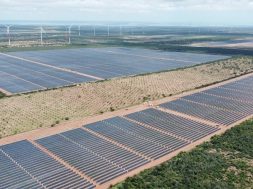
Proterra Rolls Out $200 Million Electric Bus Battery Leasing Program With Mitsui
Electric buses require more upfront investment than their diesel counterparts. Or at least they used to.
All-electric buses hold many benefits over their diesel counterparts, including lower operating costs. The sting is in their bigger upfront price tag, clouding purchasing decisions for fleet operators.
Those clouds may finally be about to part.
U.S. electric bus maker Proterra on Tuesday announced a $200 million credit facility to scale up its fledgling battery leasing program, a program the company says will strip out the upfront cost premium of buying an electric bus.
The credit facility is backed by Japanese investment giant Mitsui & Co., potentially signaling an influx of capital by global infrastructure investors into the slow-to-take-off U.S. electric bus market.
When Proterra talks to cities considering adopting all-electric buses, “one of the traditional areas of pushback has been the upfront capital investment required,” CEO Ryan Popple told Greentech Media.
A new diesel bus typically costs around $500,000, and the owner can be expected to shell out $1 million in operation and maintenance costs over the vehicle’s lifetime, including fuel, Popple said. In comparison, electric buses like Proterra’s cost around $750,000 including the batteries, but can be 20 percent cheaper to operate over time — bringing their total costs in line over a period of years.
Proterra’s new battery leasing program will make those lines intersect from day one, Popple said.
Customers will still buy Proterra’s buses upfront but lease the batteries over a 12-year period, including a midlife battery replacement.
“On a percent basis, it takes the upfront premium for an electric bus from 50 percent to zero,” Popple said. “You eliminate $250,000 of capital acquisition premium that you traditionally paid to invest in a higher-efficiency electric bus.”
North American market needs a spark
Silicon Valley-based Proterra, whose investors include automotive giant Daimler, is hoping its Mitsui-backed battery leasing program will provide a jolt for the U.S. electric bus market — which is in its infancy compared to the markets in Europe and especially China.
More than 85,000 urban buses with electric powertrains were sold in China in 2017, covering 90 percent of the market there, according to McKinsey & Company. Fewer than 500 electric buses were sold in North America that same year.
Things are starting to change in the U.S., albeit from a low base. Proterra deployed buses to 25 customers last year, a “big growth year” coming off 2017, Popple said. The company has already announced 45 new orders this year, including from repeat customers.
Privately owned Proterra Inc. makes buses and batteries out of three factories in California and South Carolina. Among its investors are venture capital firm Kleiner Perkins, GM Ventures, and utility Exelon’s Constellation power retailing unit.
Proterra’s $200 million battery lease credit facility could conceivably unlock 1,000 new bus purchases, Popple said. The credit facility is three times larger than the amount of money the U.S. federal government makes available each year for bus electrification, he noted.
“We haven’t seen the level of subsidization in the U.S. that we’ve seen in China, so we need to pull private capital into the game to make this happen.”
Huge asset class for infrastructure investors
On that front, Mitsui’s investment will be a critical test for the market — potentially opening the flood gates to big investors hungry for infrastructure investments in a low-yield world.
Leasing programs have long since taken hold for standard electric vehicles and the rooftop solar market. Electric buses may be a natural next step.
“One of the reasons this program is important to us is we need to ensure that global financing firms understand how big of an asset class this could be,” said Popple, an early employee at Tesla Motors.
He noted that the entire $200 million credit facility could be used up by just one of the top 20 transit fleets in the U.S. transitioning to electric buses.
“If we show rapid uptake in consumption of this facility, global banks are always looking for places to generate return,” he said. “The infrastructure banking sector in particular is keeping a really close eye on this space — on distributed energy, on smart grid space, on microgrids.”
“Their traditional market is going away,” Popple added. “If you look at the market for financing and central coal-fired power plants, even natural-gas plants, that market is shrinking very quickly.”
“So that asset class which has traditionally been financing billions of dollars of fossil fuel infrastructure — it needs to find another market to generate a return.”
















